Jetpacks and Bazookas: Jonny Quest
Who was the most influential person in the history of the American fantastic imagination? Was it a founding father like Washington Irving, Edgar Allan Poe, or Nathaniel Hawthorne? Or could it be a golden-age great like Robert A. Heinlein or Isaac Asimov or the editor who shaped their early careers, John W. Campbell? Certainly, the big three of Weird Tales, H.P. Lovecraft, Robert E. Howard, and Clark Ashton Smith, have set the pattern for countless imitators down to the present day. Perhaps it was a pure pulpster like Edgar Rice Burroughs or a more literary type like Ray Bradbury, or someone who came to the fore later, like Frank Herbert or Poul Anderson. Maybe it was someone less traditional, like Philip K. Dick, Ursula Le Guin, Harlan Ellison, Joanna Russ, or Samuel R. Delaney.
It’s a fun question to contemplate and a tricky and enjoyable argument to make, whoever your choice is. For myself, I don’t think any of the worthies I’ve mentioned had the widespread, long-term influence of my nominee(s): William Hanna and Joseph Barbera. (But then, if asked to name the single greatest work of American fantasy, I’m likely to blurt out that it’s the 1964 Rankin-Bass TV special Rudolph the Red-Nosed Reindeer.)
William Hanna and Joseph Barbera, 1988
Skeptical? I can’t say I’m surprised, but just consider the scope of the Hanna-Barbera “universe,” containing as it does (and this is a very pared-down list):
- The Flintstones (a vision of prehistory at least as convincing as any found in those Mammoth Hunter books)
- The Jetsons (keeping the dream of the flying car alive since 1962)
- Captain Caveman
- Josie and the Pussycats (in outer space, dammit)
- Atom Ant
- Birdman and the Galaxy Trio
- The Impossibles (arguably better than eighty percent of the past half-century’s iterations of the Avengers)
- Space Ghost and Dino Boy
- Moby Dick and the Mighty Mightor (WTF was not a thing in 1967)
- Wheelie and the Chopper Bunch (still miles ahead of Google or Tessla in getting self-driving cars on the road)
- Captain Planet and the Planeteers, and
- The Herculoids
to say nothing of that talking bear and his pick-a-nick baskets (freakish mutation or Doctor Moreau-like genetic manipulation? Beats me, but whatever the answer is, I’ll bet the Ranger won’t like it.)
The Hanna Barbera Universe
I can’t in good conscience include Scooby-Doo here, because, as those meddling kids always discovered, that show’s every supernatural manifestation always wound up being attributable to nothing more than a concealed tape recorder and a bucket or two of luminous paint.
But as any footie pajama wearing, Captain Crunch eating, eight a.m. Saturday morning cartoon watching child of the 60’s can attest, for pure gosh-wow SF-tinged pulp adventure, none of them can hold a candle to Jonny Quest, which ran for one original season, from the fall of 1964 to the spring of 1965 (in prime time, no less), after which it immediately became a fixture in seemingly endless reruns.
WTF
The show’s setup couldn’t be simpler. Sometime in the near future – near enough for there to be no such thing as microwave ovens but future enough for personal hovercraft to be no big deal – Dr. Benton Quest (one of the world’s “top scientists”) roams the globe, troubleshooting various problems for the U.S. and other friendly governments. (We’re never told what Dr. Quest is a doctor of, and it’s impossible to pin down his specialty. Is it nuclear physics? Chemistry? Geology? Botany? Oceanography? Molecular biology? Who knows? He shows a deep knowledge of all of these fields and more, like that guy they had to retire from Jeopardy.)
The Quest Clan
Quest needs every bit of this expertise, plus extensive knowledge of Child Psychology and Home Economics (maybe that’s what his Ph.D. is in), because he’s accompanied on his unfailingly hazardous jobs by two eleven year old boys – his son Jonny, and Jonny’s best friend Hadji, an orphan “adopted” by Dr. Quest after Hadji saved his life in Bengal. (I use quotes around adopted because Hadji’s official status remains undefined, though for all intents and purposes he’s a full member of the family.) In case anyone forgets that Hadji hails from the Indian subcontinent, he wears Nehru jackets and a jeweled turban that he never, ever takes off, to say nothing of indulging in mystic “Eastern” tricks like snake charming, hypnotism, and even the odd bit of levitation.
The group is rounded out by Dr. Quest’s ultra-skilled bodyguard, Roger “Race” Bannon (whose look was supposedly modeled on 50’s manly-man actor Jeff Chandler). Race can pilot any plane, drive any car, sail any boat, and operate any simple or complex machine, including – most especially – firearms. He can also pitch a tent, break a judo hold, and plant and detonate explosives. I don’t ever remember seeing him fold laundry or vacuum the house, but I’m sure he could do both at the same time and then whip up a tasty, nutritious casserole.
Race and Jeff — separated at birth
Also along for the ride is Jonny’s dog Bandit, a small white bulldog with black “mask” markings around his eyes, hence his name. Bandit’s invariably ill-timed staccato barks endanger the Quest’s lives an average of three times an episode. I’d get rid of the mutt, but the boys are attached to him and insist on looking for him whenever he gets lost, which also happens three times an episode.
Where’s Mom? It’s stated early on that Jonny “lost” his mother some time before, but the circumstances are never clarified, though it’s hinted that she might have been the victim of a hostile foreign power, which is why what’s left of the family needs a bodyguard. But there are other possibilities; perhaps she just wandered away like Bandit, or maybe she went down to the basement to take Dr. Quest a tuna sandwich and iced tea and carelessly stepped in front of a death ray he was tinkering with. (I tend to think that she just asked the wrong questions about the death ray Dr. Quest was tinkering with. In 1964 the last thing you wanted to do was get caught with one toe over the line in matters of national security.)
Whatever happened to Mrs. Quest, it’s an unconventional world that Jonny and Hadji live in, jetting from one exotic locale to the other in the company of two male parents instead of one. I’ll let you draw your own conclusions about the group’s inner dynamics and will only state the obvious: 1964 was not 2020, though in a 2005 episode of Harvey Birdman, Attorney at Law, Birdman handled the case of Bannon v. Quest, in which Race sought to gain custody of the boys from his “partner,” claiming that he had served as Jonny and Hadji’s main caregiver.
He had a strong case, but in any event the remainder of this piece will focus on the modern Jonny Quest, not the postmodern one, just as I’ll ignore the 1986 New Adventures of Jonny Quest and 1996’s Real Adventures of Jonny Quest. These subsequent iterations aren’t canon as far as I’m concerned; the true Quests are forever frozen in the Lyndon Johnson era like insects in amber, and that’s that.
In a world without mothers, helicopter parenting takes on a new meaning, as Dr. Quest and Race frequently do their parenting out of actual helicopters, and instead of admonishing Jonny and Hadji to finish their vegetables or wash behind their ears, the only directions the grown-ups ever give the boys are to pull the pin and count to three, and squeeze, not pull, the trigger. (Just kidding. The grown-ups do most of the shooting; except in the direst of emergencies, eleven-year olds are too young to handle submachine guns. Once they hit twelve, though – watch out!) Dr. Quest does sometimes tell the kids that they must finish their homework before taking the hydrofoil out for a spin, but no one seems to take this requirement too seriously.
From the vantage point of the 21st century, it’s easy to find things to disapprove of in Jonny Quest. Is it full of the patronizing treatment of indigenous peoples that springs from the smug assumptions of American exceptionalism? Absolutely, though in those early years of the Great Society, such things were seen as the benevolent offerings of a good neighbor instead of the bullying interference of an imperialist hegemon… unless you lived in Havana, Hanoi, or Cairo, of course. (In one episode, “The Curse of Anubis,” the villain schemes to establish “real unity among Arab nations.” How dare he. Gamal Abdel Nasser, the President of Egypt at the time, had the same ambition. The Jonny Quest bad guy wound up being walloped by a vengeful mummy, so Nasser probably wasn’t a big fan.)
The Price of Arab Unity
What with the show’s burly ethos of can-do competence and its marginalization of one half of the human race (can’t be more marginalized than getting written out of the series before the first episode, right Mom?), it goes without saying that Dr. Quest and Race are appalling examples of what is now called toxic masculinity. Actually, they’re not. The even tempered Quest and Race are always kind, patient, and understanding with the boys and never shout at, humiliate, berate, or physically discipline them, even when Jonny and Hadji disobey orders and sneak off to spy on the international criminals and ruthless uranium thieves that the group regularly tangle with, which the kids do… let’s see… about three times an episode.
The adults don’t indulge in any hugging or crying, it’s true, but this likely stems less from repressed emotions than from that fact that Jonny Quest’s event-heavy episodes were only twenty five minutes long, and our heroes were too busy trying to stay attached to their butts to spend much time getting in touch with their feelings. There was so much parachuting and scuba diving and scorpion dodging to get in that little room was left for anything else. Perhaps if Oprah had guested on the show the way Sonny and Cher did on Scooby-Doo, things would have been different, but my guess is that in the charged circumstances of Jonny Quest Ms. Winfrey would have wound up locking and loading along with everyone else.
Who thought this was a good idea?
Elementary schoolers operating heavy machinery or dodging bullets (or operating heavy machinery while dodging bullets, which happens more than once) is looked on askance these days – anywhere outside of Tennessee, that is – but that previously mentioned ethos of competence and self-reliance means that Jonny and Hadji have at least been taught the right way to do these things, which enables them to rescue the adults just as often as the adults rescue them, and after all, you don’t worry about the forest burning down if an Eagle Scout is building your campfire. Anyway, what are you supposed to do when you’re attacked by dinosaurs or savage condors or commie robots or energy monsters? In those cut and dried Cold War years, holding hands and singing “Kumbaya” didn’t cut it.
Jet packs and Bazookas
Indeed, if Jonny Quest has an underlying premise, it’s that any problem that can’t be solved with jet packs and bazookas is a problem that’s not worth solving. Of course in the real world that philosophy would soon be weighed and found wanting in the jungles of Southeast Asia, but it was a perfectly reasonable assumption in the hermetically sealed world of the show, peopled by thoroughly vile villains who literally rub their hands together and cackle with glee at the thought of their impending triumph.
These baddies range from outrageous-accented French-Canadian gold smugglers to Australian poachers, from Nazi war criminals to mad doctors and megalomaniac masterminds of all descriptions. Foremost among them is the show’s one recurring villain, Dr. Zin, a bargain-basement Fu Manchu so addicted to the routine of hand-rubbing and cackling that a twelve-step program couldn’t begin to help him. He has to rule the world just to recoup what he must spend on throat spray and hand moisturizer.
Jade and Race
(The only other supporting character to appear more than once is Jade, a femme fatale right out of a 40’s noir; an equivocal ally of the Quest clan, she and Race once had some sort of thing going. Shield your eyes, boys.)
Lizard men and laser cannons
Add to these juicy bad guys their outlandish tools of conquest – Pteranodons, cave men, giant crabs, slavish armies of identically uniformed minions constructing missile bases under remote swamps or “perfecting the greatest destructive force known to man” in hollow volcanoes (the early Bond movies were clearly a big influence), laser-cannon wielding lizardmen, venomous snakes, enormous man-eating lizards, and perhaps most beloved of Jonny Quest fans, a spider-like robot spy unleashed by Dr. Zin to get the goods on the “para-power ray gun” that Dr. Quest is working on – which Quest finally uses to destroy the robot spy. (You would think a first-rank evil genius would have seen a sucker punch like that coming.)
Minions and hovercraft
Some episodes employ these well-worn props so skillfully as to be 1950’s science fiction movies in miniature. “The Invisible Monster,” about an energy creature run amok, wouldn’t be out of place alongside The Thing or The Blob.
The Robot Spy
The show’s appeal is easy to understand, with its fast-paced action adventure plots filled with cool technology in the hands of two juvenile heroes who get to ride camels and explore the bottom of the sea instead of having to sit in a classroom or do chores. With a formula like that, how could Jonny Quest not be popular? (The series was cancelled after one season because of its high production costs, not because of its ratings, which were excellent.)
The para-power ray gun
Just last year the complete original series was released on Blu-ray, a good testimony to both its iconic status and entertainment value, though the case does bear the warning that this old kid’s show is “intended for the adult collector and may not be suitable for children.”
Its undeniable cultural baggage would certainly keep it off the air today, at least in its original 60’s form, but that’s a heavy weight to load on a cartoon show concocted to peddle Hot Wheels and Froot Loops, and Jonny Quest should at least get some progressive points for having a person of color as an equal member of the team, just as courageous and competent and smart as anyone else.
Hadji saves Dr. Quest
At bottom the true message of the series is that with a little help from adults who trust them, kids are sharp enough to handle anything, and can even hold their own with monsters and madmen and saboteurs (and not just kids who happen to be boys, either – you know darn well they would have brought a girl into the group if the show had gone on longer; it’s too obvious a move not to make. Girls eat Froot Loops too.)
So board the jet and buckle up; just make sure that in between bouts with crazed would-be world dictators and the sinister agents of unnamed foreign powers, you eat your dinner and do your homework (all STEM subjects, by the way; I’m sure that Jonny and Hadji never had to write a paper on the poetry of Elizabeth Barret Browning.)
Adventure awaits!
Politically incorrect? Certainly. Socially regressive? Guilty, your Honor. But even with all of its faults admitted, for the kids who grew up loving it, Jonny Quest’s air of early-morning confidence and perfect blend of freedom and danger and fun make the show a small classic of childhoods past, a perfect 60’s idyll. You might not want to live there, but it sure is a nice place to visit.
Thomas Parker is a native Southern Californian and a lifelong science fiction, fantasy, and mystery fan. When not corrupting the next generation as a fourth grade teacher, he collects Roger Corman movies, Silver Age comic books, Ace doubles, and despairing looks from his wife. His last article for us was Help! I’ve Fallen into Varney the Vampire and I Can’t Get Out!.
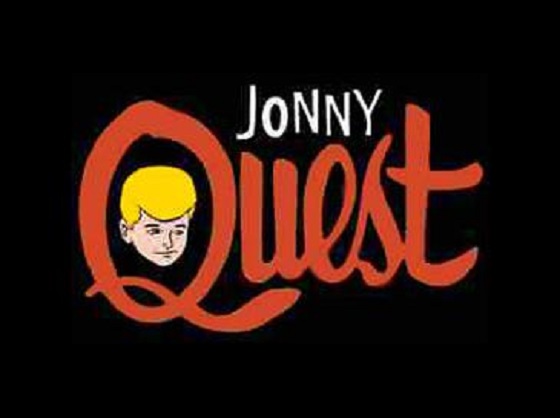
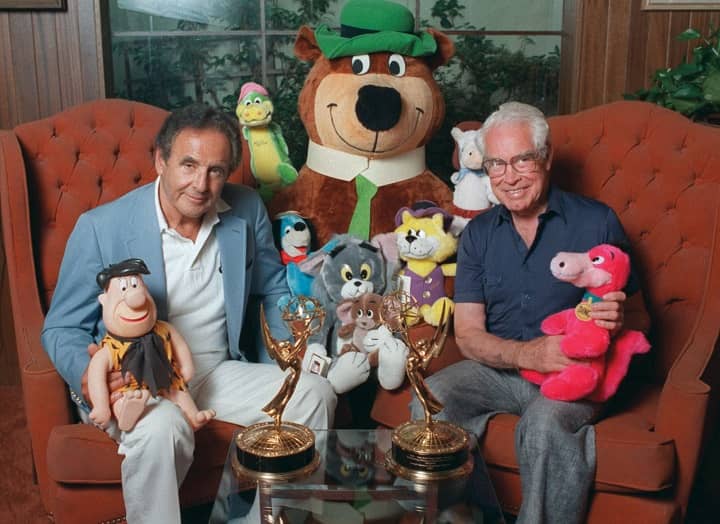
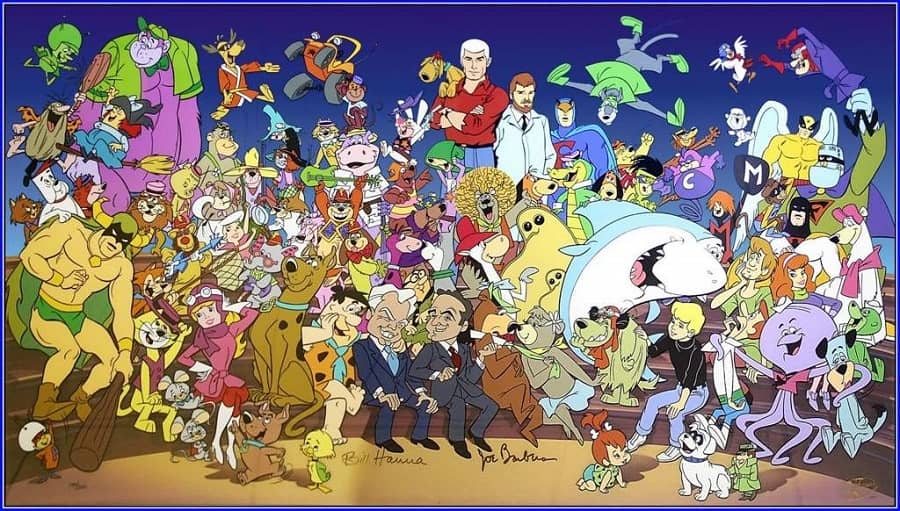
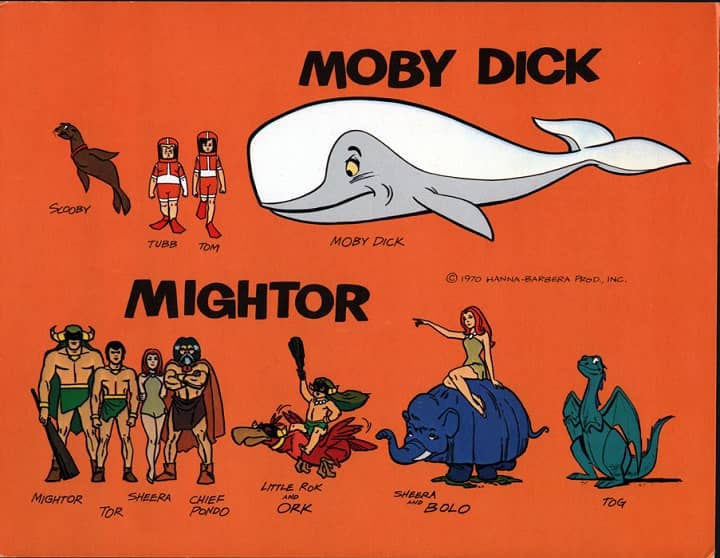
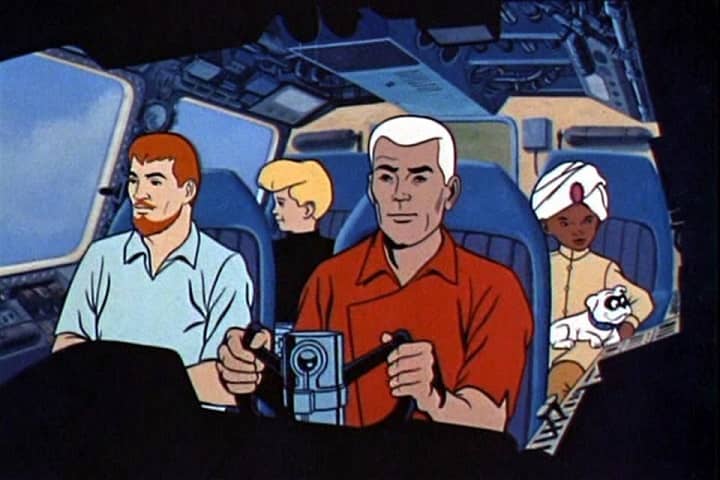
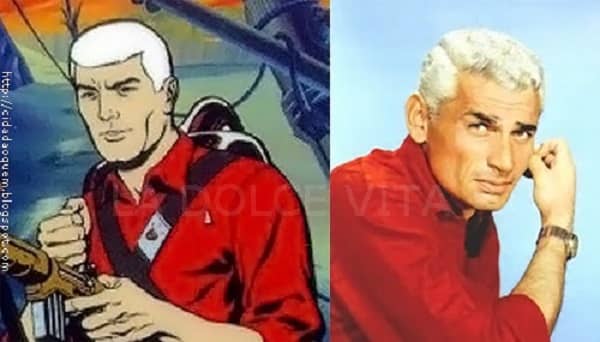
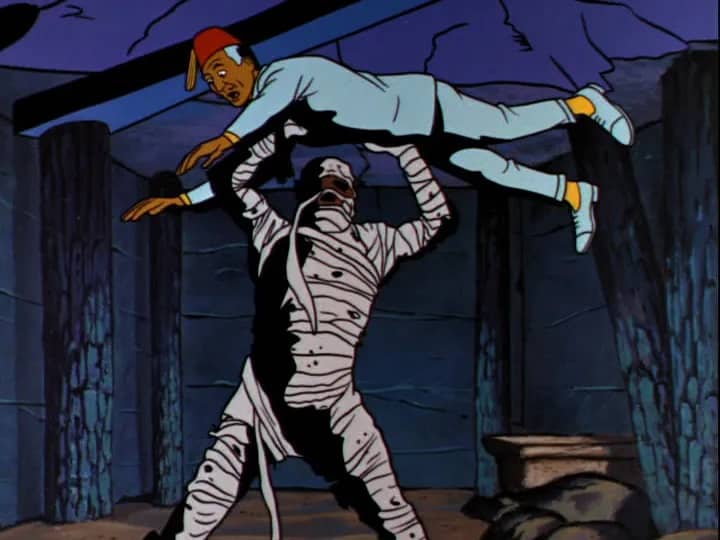
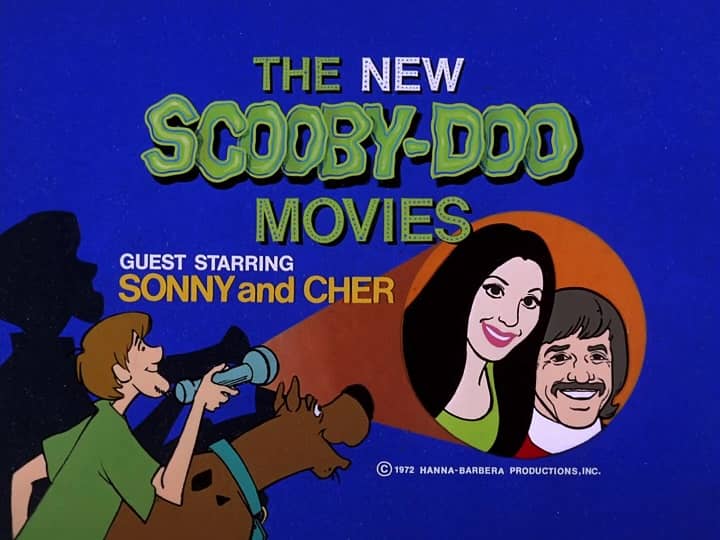
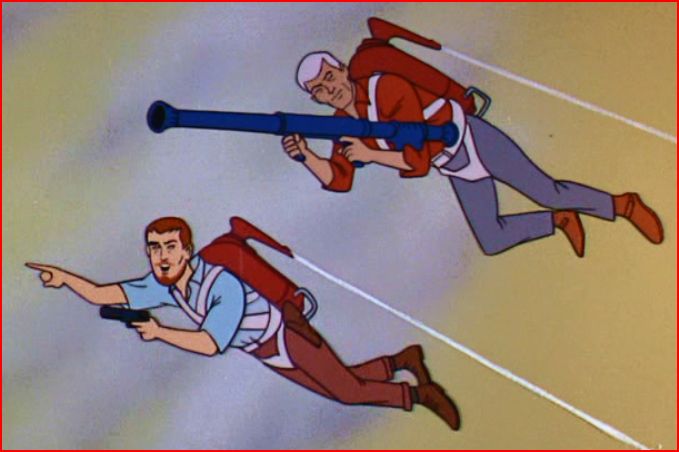
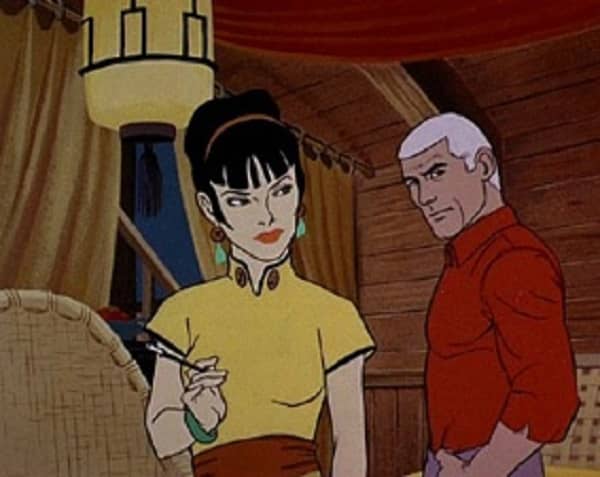
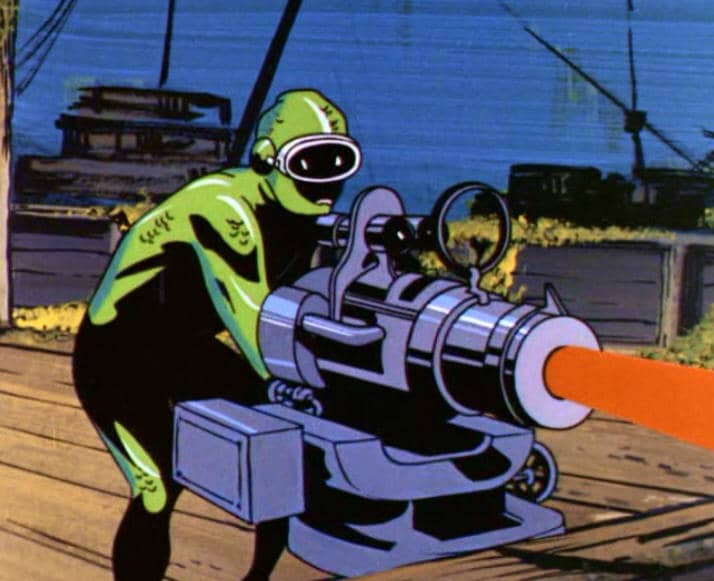

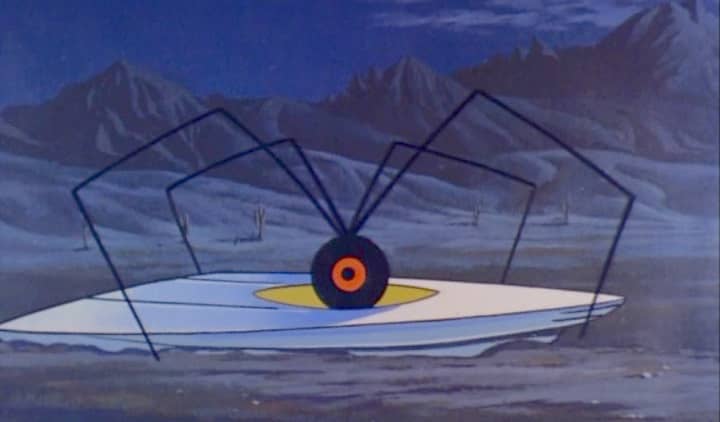
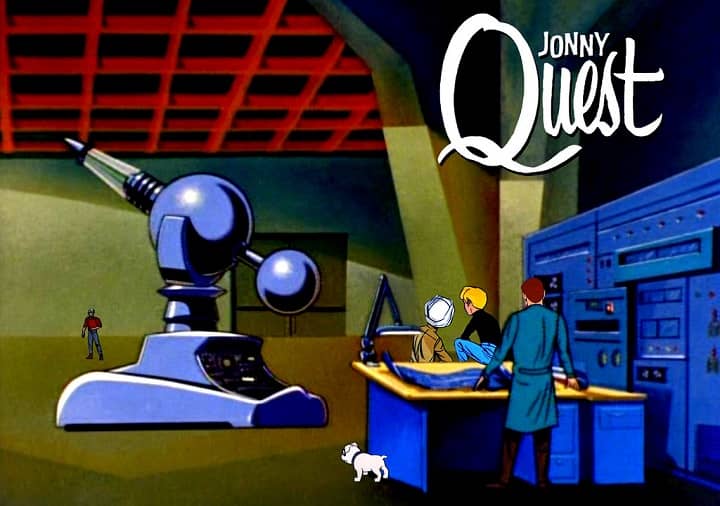
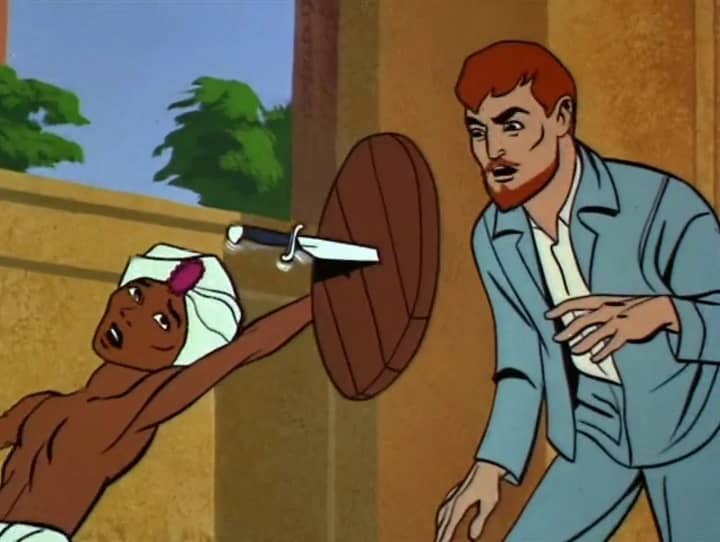
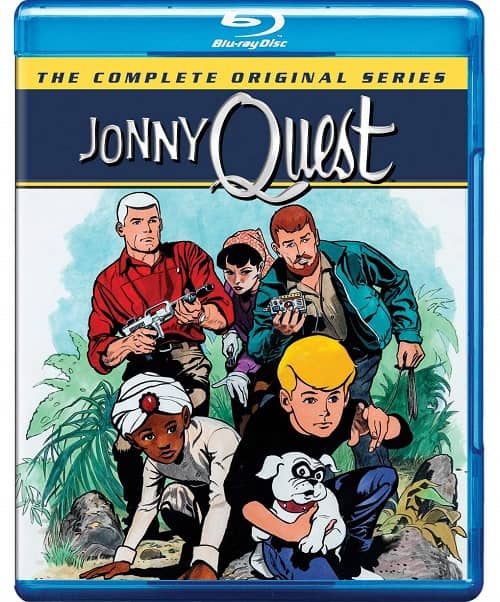
Thomas, this loving and playful tribute was almost as much fun as the original series. Thanks for the memories!
Ah! I wish they’d shown this series in Ottawa when I was growing up. I have still never seen an episode of JONNY QUEST.
I bet I would have loved it.
The soundtrack was also, as the kids say today (do they? I can’t keep up with these things) bangin’.
About 75% of Venture Bros. is riffing on Jonny Quest, to the point where they have actual grown-up and strung-out Jonny (last name never given, I believe) as a recurring character.
I’m glad to see someone else that loves the show like I do. FWIW- I have edited some of the original sound track into a 36 minute Jazz suite, and cut a video picking out scenes to go with the music. (No claims of ownership, and TOTALLY not-for profit) You can check it out at https://www.youtube.com/watch?v=iMUQ7X-WHZs if you are interested. No harm, no foul if not.
What a cool idea, John – I’ll be giving it a listen!
You’re right about the Venture Brothers, Joe, and there’s also an episode of Freakazoid that’s a spot on Jonny Quest parody.
Thank you, Mr. Parker for a great post. The Herculoids alone would have made Hanna & Barbera national treasures, but you’re right when you say no one can hold a candle to Jonny Quest. One of the best kids shows ever and Joe H. is right – that soundtrack WAS bangin’.
I had no idea the Venture Brothers owed so much to Jonny Quest; that gives it quite a pedigree since JQ owes a lot to the old Jack Armstrong, All American Boy radio show, scripted in the late 30’s by none other than the great Talbot Mundy.
Mr. O’Neill, you have to see one (or more) Jonny Quest episodes; you won’t regret it.
The first two seasons of Venture bros is an irreverent mashup of JQ and silver age marvel. It also has an episode with Race.
I still remember the absolute chill I felt when I saw the episode with the mummy as a child.
I grew up in the ’70s, and Johnny Quest was only in occasional rerun, unlike Scooby-Doo. By 8 or 9 I had likely seen ever Scooby-Doo episode multiple times, and was used to the trope that the monster was always going to be a guy in a mask.
And then I saw the Jonny Quest show with the mummy. And it was NOT a dude in a mask. It was an actual menace that couldn’t be explained away. It was an implacable, unstoppable undead monster. I don’t remember anything else about the episode but that mummy, which was freakin’ terrifying and awesome. Its relentless, ponderous walk. The musical sting as it placed each foot. Wow.
I haven’t seen it since. Maybe one of these days I should.
I worried a lot about The Relentless Mummy – how could you get away? You could fly an airplane to another continent but The Undead Mummy would just keep walking towards you wherever you went on earth! If the Mummy could do 10 miles a day it would reach North America (walking under the sea) in roughly 2 years and then it would reach you! Your only hope was to change continents every 2 years so it had to change direction!
I loved Jonny Quest. Heavy, dramatic music; people dying; sinister villains; and real monsters. Just what a sugar-high, footie-pj-wearing young boy needed!
Except for “The Invisible Monster.” That one scared the bejesus out of me. The tension of the footprints, the sound of it screaming…
How scared? Years later (when I was 12 or 13), I was looking over the Saturday morning TV schedule and saw Jonny Quest on the list. “Fantastic! …Unless it’s that episode with the energy monster.” It was. I noped out of it.
However, I’ve only seen one or two episodes of The Herculoids, and that might have challenged Jonny Quest for the top spot if the stories were as exciting. The natural armaments of the Herculoids’ menagerie would have had a lot of appeal to that warm-footed sugar addict. (The exploding-rock-shooting rhino-like thing was my favorite of their creatures.)
Jeff, I too love the Herculoids, but it’s only fair to say – if you’ve seen one or two episodes, you seen them all!
The one with a missile base in the swamp is a favorite of mine, because who wouldn’t want a base in the swamp, and the episode where a sea monster runs wild on a freighter is both fun and kind of moody.
But that Invisible Monster, though. It was the stuff of dreams. The one cannot miss episode.
I was a little surprised there was no mention of Doug Wildey. He was very good.
[…] (Black Gate): The show’s setup couldn’t be simpler. Sometime in the near future – near enough for there […]
The reason why Jonny Quest has lost his mother is so he can HAVE TWO DADS! I thought everybody realized this! How cool is that?
I remember watching this cheaply made but somehow endearing show with my two children decades ago. I remember the villainous Dr. Zin surfacing many times with “So, ve meet again, Doctor Kvest!” And just now on CNN I listened to the aeronautics expert Richard Quest explaining a crash in Canada. Johnny and Richard, separated at birth?
[…] © Black Gate […]